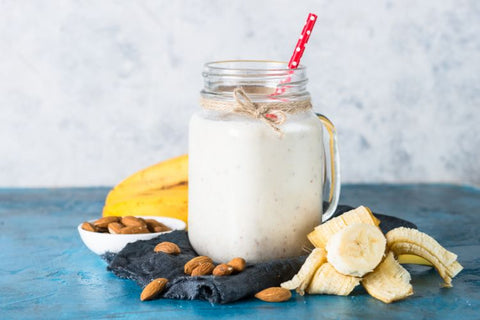Gluten-free protein powders have gained popularity, especially among individuals with gluten intolerance or sensitivity. However, many people also have other dietary restrictions, such as lactose intolerance, soy allergies, or preferences for certain diets like keto or Paleo. This article explores how gluten-free protein powders can be combined with various other dietary restrictions to accommodate a wide range of dietary needs.
Dairy-Free Options
Many people choose to avoid dairy due to lactose intolerance, dairy allergies, or vegan lifestyles. The good news is there are excellent plant-based protein powders available that provide a great alternative to whey protein, the most common dairy-based protein powder.
Gluten-free protein powders are generally suitable for lactose-intolerant or dairy-allergic individuals. Here's why:
- Gluten and Lactose are Different: Gluten is a protein found in wheat, barley, and rye, while lactose is a sugar found in milk. They are completely different molecules and cause different sensitivities.
- Gluten-free Doesn't Mean Dairy-free: While some protein powders might be both gluten-free and dairy-free, being gluten-free doesn't automatically mean it's lactose-free.
- Focus on Plant-Based Powders: Look for protein powders made from plant sources like peas, rice, hemp, or soy (if you don't have a soy allergy). These naturally avoid dairy and lactose.
Soy-Free Varieties
While some protein powders contain soy, there are soy-free options available, accommodating individuals with soy allergies or those who prefer to avoid soy products.
Individuals with soy allergies or preferences looking for dairy-free protein powder have several excellent options. Here's a breakdown of some popular soy-free varieties:
- Whey Protein Isolate: Whey isolate undergoes processing to remove most lactose and soy. Look for brands that specifically advertise being soy-free alongside being lactose-free.
- Pea Protein Powder: A hypoallergenic plant-based protein source, pea protein powder is a great option for those with soy allergies or following a vegan diet. It's also easily digestible and rich in branched-chain amino acids (BCAAs) that support muscle growth and repair.
- Rice Protein Powder: Another hypoallergenic plant-based option, rice protein powder is known for being easily absorbed by the body. However, it has a slightly lower protein content per serving compared to other options.
- Hemp Protein Powder: A source of complete protein, containing all nine essential amino acids, hemp protein powder also boasts healthy fats and fiber. However, it has a lower protein content per serving than some other plant-based options and a slightly earthy taste.
- Mixed Plant-Based Protein Powders: Many brands offer protein powders that combine various plant sources like peas, brown rice, and pumpkin seeds to create a more complete amino acid profile and improve taste and mixability. Be sure to check the ingredients list to ensure they are soy-free.
Choosing the right Soy-Free Powder
Consider these factors when selecting a soy-free protein powder:
- Your Needs: Are you looking for a protein powder for muscle building, general health, or weight management? Different options may be better suited for specific goals.
- Taste and Mixability: Try samples or smaller sizes of different brands to find a flavor and texture you enjoy.
- Ingredient Quality: Look for protein powders with recognizable, whole-food ingredients and minimal processing.
Nut-Free Alternatives
While many gluten-free protein powders might be suitable for those with celiac disease or gluten sensitivity, they don't necessarily address nut allergies or preferences. Here's how some brands cater to those with nut allergies and dietary restrictions:
- Plant-Based Options: The good news is many gluten-free protein powders are naturally nut-free because they rely on plant sources like peas, rice, and hemp. This makes them a perfect fit for those with both gluten and nut allergies/preferences.
- Carefully Read Labels: Even with gluten-free labeling, it's crucial to double-check the ingredients list for any nut traces. Look for labels that specifically mention "nut-free" or "peanut-free" for added confidence.
- Soy Options: Soy protein powder can be a gluten-free protein source, but be aware of potential soy allergies. If you have a soy allergy, look for other plant-based options like pea or rice protein.
Egg-Free Formulations
The good news is that many gluten-free protein powders are also formulated without eggs! This caters to individuals with egg allergies or those following vegan or certain religious dietary preferences. Here's why:
- Focus on Plant-Based Sources: Many gluten-free protein powders are naturally egg-free because they rely on plant-based proteins like pea, rice, hemp, or even some seed-based blends.
- Egg-Based Protein Powders are Uncommon: While they exist, egg-based protein powders are less popular than whey (dairy-based) or plant-based options. This makes it more likely that a gluten-free protein powder you find will also be egg-free.
- Check the Label Regardless: Even with a gluten-free label, it's wise to double-check the ingredients list for any egg traces. Look for labels that specifically say "egg-free" for complete assurance.
Low FODMAP Choices
While gluten-free doesn't automatically equate to low FODMAP, there are some excellent options within the gluten-free protein powder category that can be suitable for individuals with IBS or digestive sensitivities. Here's why:
FODMAPs and IBS: FODMAPs are a group of fermentable carbohydrates that can trigger digestive issues in people with IBS. Following a low FODMAP diet can help manage symptoms like bloating, gas, and diarrhea.
Suitable Protein Sources: Certain plant-based proteins are naturally low in FODMAPs, making them ideal for those with IBS or digestive sensitivities. These include:
- Pea Protein Isolate: A popular choice, pea protein isolate is generally well-tolerated and low in FODMAPs. Look for isolates specifically labelled as low FODMAP for added confidence.
- Rice Protein Powder: Another potentially low FODMAP option, rice protein powder is known for being easily digestible. However, some people with IBS might find it ferments more than pea protein.
Finding Low FODMAP Powders: There are two main approaches to finding low FODMAP protein powders:
- Look for Low FODMAP Certification: The Monash University Low FODMAP program certifies certain foods as low FODMAP. Look for protein powders with this certification for the most reliable option.
- Choose Single-Source Plant Proteins: Opting for protein powders made from a single low FODMAP source like pea isolate reduces the risk of encountering hidden FODMAPs in added ingredients.
No Artificial Additives
The good news is that the demand for clean, natural ingredients is growing! Even within the gluten-free protein powder category, you'll find a great selection of options that are free from artificial additives, preservatives, and sweeteners.
Here's what to look for:
- Natural, Plant-Based Sources: Many gluten-free protein powders are naturally free from artificial ingredients because they rely on plant sources like peas, rice, hemp, or seed blends. These offer a clean and natural protein source.
- Minimal Ingredients: Look for protein powders with a short list of recognizable ingredients. This often indicates a focus on whole foods and minimal processing.
- Free-From Labels: Many brands proudly advertise their protein powders as free from artificial additives, preservatives, and sweeteners. Look for labels mentioning "natural," "unsweetened," "no artificial flavors," or "no preservatives."
- Transparent Labels: Brands committed to clean ingredients will have a clear and detailed ingredient list. This allows you to easily identify any potential allergens or unwanted additives.
Keto-Friendly Formulations
The ketogenic diet, often shortened to "keto," emphasizes high fat, moderate protein, and very low carbohydrate intake. This shift in fuel sources pushes the body into ketosis, a metabolic state where fat becomes the primary energy source.
The good news is that many gluten-free protein powders can be a helpful tool for those following a keto diet. Here's why:
- Low-Carb Focus: Many gluten-free protein powders are naturally low in carbohydrates because they are derived from plant sources like peas, rice, or hemp. This aligns perfectly with the low-carb requirements of a keto diet.
- Supplementing Protein Needs: While protein intake on keto is moderate, it's still crucial for muscle health and satiety. Protein powders can be a convenient way to ensure you're meeting your protein goals without exceeding your carb limit.
- Minimal Added Sugars: Look for protein powders with minimal to no added sugars. Many keto-friendly protein powders are unsweetened or use sugar alcohols like stevia, which have minimal impact on blood sugar levels.
Here are some things to consider when choosing a keto-friendly, gluten-free protein powder:
- Check the Carbs: The exact amount of carbs will vary between brands and protein sources, but aim for powders with less than 5 grams of carbs per serving to stay comfortably within your keto macros.
- Read the Ingredients List: Avoid protein powders with added sugars, grains, or other high-carb ingredients. Look for simple, recognizable ingredients that align with your keto goals.
- Consider Fat Content: Some keto-friendly protein powders even include healthy fats from sources like MCT oil or coconut milk powder. These can be a bonus for those looking to boost their overall fat intake on keto.
Paleo-Compatible Choices
The Paleo diet emphasizes whole, unprocessed foods similar to what our hunter-gatherer ancestors might have consumed. This means avoiding grains, legumes (including soy), dairy products, and refined sugars.
While some gluten-free protein powders might be gluten-free, they may not be suitable for Paleo due to other ingredients. Here's what to look for in a Paleo-friendly protein powder:
- Grain-Free and Legume-Free Sources: Paleo excludes grains and legumes, so avoid protein powders derived from these sources like wheat, soy, or peanuts.
- Focus on Animal-Based Proteins: Paleo encourages animal protein sources like grass-fed beef, pastured eggs, and wild-caught fish. Look for protein powders made from these ingredients.
- Bone Broth Protein Powders: An emerging Paleo-friendly option is bone broth protein powder. Made from simmered bones, it provides protein, collagen, and essential minerals that align with the Paleo philosophy.
- Limited Plant-Based Options: While some plant-based protein sources like nuts and seeds are allowed on Paleo in moderation, they are not staples. Double-check the ingredients list to avoid hidden plant-based protein sources not typically consumed on Paleo.
Challenges and Considerations:
- Limited Choices: Finding a truly Paleo-compliant protein powder can be more challenging than gluten-free options. Be prepared to do your research and explore niche brands catering to the Paleo market.
- Natural Sweeteners: Some Paleo-friendly protein powders might use natural sweeteners like stevia or monk fruit. While generally Paleo-approved, these can impact your taste preference. Consider unsweetened options if you prefer to avoid them entirely.
- Focus on Whole Food Sources: Remember, the Paleo diet prioritizes whole, unprocessed foods. Protein powder should be a supplement, not a main source of protein in your Paleo diet.
Non-GMO Options
The demand for non-GMO ingredients is on the rise, and the good news is that many gluten-free protein powders cater to this preference. Here's why non-GMO options might be important to you:
- Avoiding Genetically Modified Organisms (GMOs): GMOs are organisms that have had their genetic makeup altered in a lab. Some people choose to avoid GMOs due to concerns about potential health or environmental risks, although there is no scientific consensus on these concerns.
- Transparency and Labeling: Choosing a non-GMO protein powder demonstrates a brand's commitment to transparency and using ingredients that align with your values.
- Clean Label Approach: Many non-GMO protein powders often focus on a clean label approach, meaning they use recognizable whole-food ingredients and minimal processing. This can be a plus even if you're not specifically concerned about GMOs.
Finding Non-GMO Protein Powders:
- Look for Non-GMO Labels: Many brands proudly display "Non-GMO Project Verified" or similar labels on their packaging. These certifications indicate independent verification of the ingredients' non-GMO status.
- Organic Certification can Imply Non-GMO: While not a guarantee, protein powders with USDA Organic certification generally come from non-GMO sources as the National Organic Program prohibits the use of most GMOs in organic products.
- Read Ingredient Lists: While labels are helpful, it's always wise to double-check the ingredients list. Avoid ingredients derived from commonly GMO crops like corn or soy unless they are explicitly labeled as non-GMO
Allergen-Free Facilities
Finding a gluten-free protein powder is a great first step for those with celiac disease or gluten sensitivity. But what if you have multiple allergies or dietary restrictions? The good news is that some brands take things a step further by producing their gluten-free protein powders in allergen-free facilities. Here's why this can be important:
- Reduced Risk of Cross-Contamination: Even facilities that produce gluten-free products might handle other ingredients like dairy, nuts, or soy. This can lead to accidental cross-contamination, posing a risk for people with severe allergies.
- Peace of Mind for Multiple Allergies: If you have celiac disease and a nut allergy, for example, an allergen-free facility provides greater confidence that the protein powder is truly free of all your triggers.
- Transparency and Trust: Brands that invest in allergen-free facilities demonstrate a commitment to safety and catering to individuals with complex dietary needs.
Conclusion
Gluten-free protein powders are a great option for those with celiac disease or gluten sensitivity, but they can also cater to a variety of other dietary needs. With plant-based sources, allergen-free facilities, and options for keto, paleo, and low-FODMAP diets, there's a gluten-free protein powder out there for everyone. Whether you're looking for a clean, minimally processed powder or one that aligns with specific health goals, explore the diverse options available to find the perfect fit for your unique dietary needs and preferences.
Key Takeaways:
- Gluten-free protein powders suit various dietary restrictions.
- Plant-based alternatives cater to lactose intolerance and dairy allergies.
- Options like pea, rice, and hemp protein are soy-free.
- Many gluten-free powders are nut-free and suitable for allergies.
- Plant-based formulations exclude eggs.
- Some options are low in fermentable carbs, ideal for IBS.
- Look for powders with minimal additives.
- Aligns with low-carb and whole-food diets.
- Many brands offer non-GMO options.
- Some powders are made in allergen-free facilities for safety.






